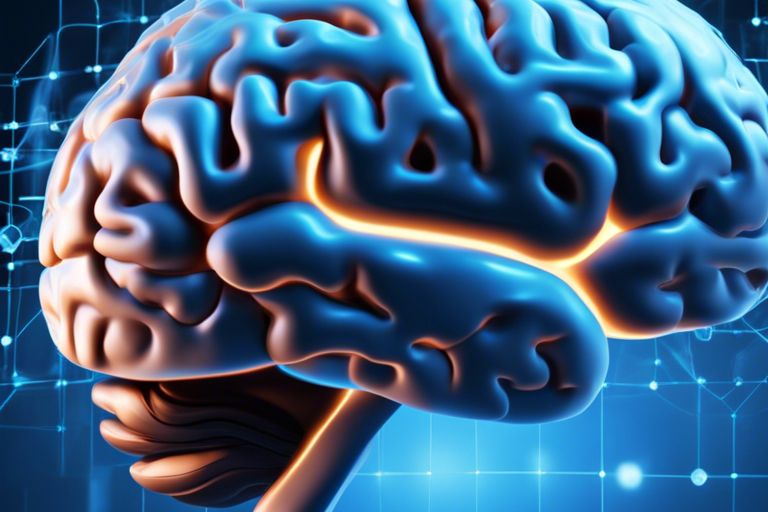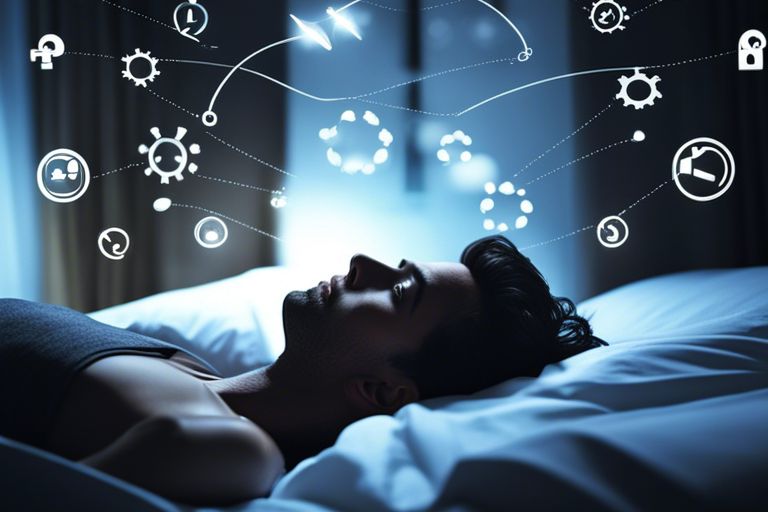Brain functions are intricate and complex, especially when it comes to matters of mental health. Anxiety is a common psychological issue that affects millions worldwide, yet its roots in the brain remain a topic of ongoing research and study. Scientists have researchd into various brain systems to pinpoint what causes this debilitating condition. In this blog post, we will explore whether there are unique systems in the brain that contribute to anxiety, shedding light on the latest findings and insights in the field of neuroscience.
Key Takeaways:
- Anxiety & Brain Systems: There are unique systems in the brain that contribute to anxiety, such as the amygdala, prefrontal cortex, hippocampus, and the hypothalamic-pituitary-adrenal (HPA) axis.
- Amygdala’s Role: The amygdala is a crucial brain structure involved in processing emotions, particularly fear and anxiety responses.
- Prefrontal Cortex Influence: The prefrontal cortex plays a role in regulating emotional responses and decision-making, affecting how we perceive and respond to anxiety-inducing stimuli.
- Hippocampus & Memory: The hippocampus helps in forming memories, including those related to stressful or fearful situations, contributing to anxiety disorders.
- HPA Axis & Stress Response: The HPA axis is involved in the body’s stress response, releasing cortisol and other stress hormones that can exacerbate anxiety symptoms.
- Neurotransmitter Imbalance: Imbalances in neurotransmitters such as serotonin, dopamine, and GABA can also contribute to anxiety disorders by affecting mood regulation and stress responses.
- Individual Variability: While these brain systems play key roles in anxiety, individual differences in brain structure, function, and genetics can also influence how anxiety manifests and is experienced.
The Neurobiology of Anxiety
One of the key areas of the brain that plays a crucial role in the development and expression of anxiety is the amygdala. The amygdala is a small, almond-shaped structure located deep within the brain’s temporal lobe. It is involved in the processing of emotions, especially fear and anxiety. To be more specific, the amygdala is responsible for detecting and responding to threat-related stimuli, triggering the body’s stress response, and activating fear and anxiety behaviors.
The Role of the Amygdala
To fuel anxiety, the amygdala processes incoming sensory information and determines whether it is potentially threatening. When the amygdala perceives a threat, it sends signals to other brain regions, such as the hypothalamus and brainstem, to initiate the body’s “fight or flight” response. This response includes the release of stress hormones like cortisol and adrenaline, increased heart rate, and heightened alertness, all preparing the body to deal with the perceived danger.
Neurotransmitter Systems Involved in Anxiety
Any dysfunction in neurotransmitter systems can lead to imbalances that contribute to the development of anxiety disorders. Some of the key neurotransmitters involved in anxiety regulation include serotonin, gamma-aminobutyric acid (GABA), dopamine, and norepinephrine. Role Serotonin is often referred to as the “feel-good” neurotransmitter and plays a critical role in mood regulation. GABA is the main inhibitory neurotransmitter in the brain, helping to reduce neuronal excitability and promote relaxation. Imbalances in these neurotransmitter systems can lead to symptoms of anxiety, such as excessive worry, fear, and panic.
Endocrine Factors in Anxiety
Some endocrine factors play a crucial role in the development and maintenance of anxiety disorders. The endocrine system consists of glands that secrete hormones into the bloodstream, affecting various bodily functions. Understanding the impact of hormones on anxiety can provide valuable insights into the biological mechanisms underlying this complex mental health condition.
The Hypothalamic-Pituitary-Adrenal Axis
HypothalamicPituitaryAdrenal (HPA) axis is a key endocrine system involved in the body’s response to stress. It consists of the hypothalamus, the pituitary gland, and the adrenal glands, which work together to regulate the production of stress hormones such as cortisol. In individuals with anxiety disorders, the HPA axis may become dysregulated, leading to excessive cortisol production and an abnormal stress response.
Stress Hormones and Their Effects
Hormones such as cortisol and adrenaline are released in response to stress, preparing the body for a fight-or-flight response. While these hormones are imperative for survival, chronic activation of the stress response can have negative effects on mental health. High levels of cortisol, for example, have been linked to anxiety symptoms such as excessive worrying and restlessness.
Factors such as genetics, early-life experiences, and chronic stress can all contribute to dysregulation of the HPA axis and abnormal cortisol levels in individuals with anxiety disorders. It is crucial to address these underlying factors in the assessment and treatment of anxiety disorders to provide comprehensive care for those affected. Any interventions targeting the HPA axis and stress hormones should take into account the complex interplay between biological and psychological factors contributing to anxiety.
Anxiety and the Prefrontal Cortex
Your brain is a complex network of interconnected regions that work together to regulate emotions, thoughts, and behaviors. One key player in the brain that is involved in anxiety is the prefrontal cortex. This region, located in the frontal lobe of the brain, is responsible for decision-making, cognitive control, and emotional regulation.
Decision-Making and Control of Fear
Fear is a fundamental emotion that is crucial for survival, helping us to respond to potential threats in our environment. The prefrontal cortex plays a critical role in decision-making processes that can either exacerbate or alleviate anxiety. Studies have found that individuals with anxiety disorders may exhibit alterations in prefrontal cortex activity, leading to difficulties in regulating fear responses.
The Impact of Neuroplasticity
With neuroplasticity, the brain’s ability to reorganize itself by forming new neural connections, there is hope for individuals struggling with anxiety. Research has shown that interventions such as cognitive-behavioral therapy and mindfulness training can improve prefrontal cortex functioning and reduce anxiety symptoms. By promoting neuroplasticity in the prefrontal cortex, individuals can learn to better control their fear responses and manage anxiety more effectively.
Control: By understanding the role of the prefrontal cortex in anxiety and the potential for neuroplasticity to reshape brain functioning, individuals can take proactive steps to improve their mental well-being. Seeking professional help, engaging in therapeutic interventions, and practicing mindfulness techniques are all strategies that can help enhance prefrontal cortex function and alleviate anxiety symptoms.
Genetic and Environmental Influences on Brain Systems
After exploring the unique systems in the brain that contribute to anxiety, it is imperative to examine into the factors that influence these systems. Genetic and environmental influences play a crucial role in shaping the brain structures that contribute to anxiety disorders. Understanding how these influences interact can provide valuable insights into the development and treatment of anxiety.
Hereditary Factors in Anxiety
To begin with, hereditary factors can significantly impact an individual’s predisposition to anxiety. Research has shown that genetic variations can contribute to the development of anxiety disorders. Certain genes related to neurotransmitter function, such as serotonin and dopamine receptors, have been linked to anxiety. Additionally, genetic factors may influence the expression of stress-regulating genes, affecting how individuals respond to challenging situations. Any disruptions in these genetic pathways can contribute to an increased risk of developing anxiety disorders.
The Effect of Life Experiences on Brain Structure
Environmental factors also play a significant role in shaping brain structures that contribute to anxiety. Life experiences such as trauma, chronic stress, or adverse childhood events can impact brain development and function. These experiences can lead to changes in neural pathways involved in emotion regulation and threat detection, increasing susceptibility to anxiety disorders. Environmental factors can also influence the production of stress hormones like cortisol, which can further exacerbate anxiety symptoms.
Hereditary and environmental influences on brain structures interact in complex ways to influence the development of anxiety disorders. While genetic factors may predispose individuals to certain vulnerabilities, environmental experiences can either exacerbate or mitigate these risks. Understanding the interplay between these factors is crucial for developing effective interventions and treatments for anxiety disorders.

Conclusion
To wrap up, there are indeed unique systems in the brain that contribute to anxiety. The amygdala, prefrontal cortex, and hippocampus play crucial roles in processing fear and regulating emotions, while neurotransmitters like serotonin and gamma-aminobutyric acid (GABA) also influence anxiety levels. Understanding these brain systems can help scientists develop more targeted treatments for anxiety disorders, providing hope for those who struggle with this mental health condition.
FAQ
Q: What are unique systems in the brain that contribute to anxiety?
A: The amygdala, prefrontal cortex, and limbic system are unique systems in the brain that play a significant role in contributing to anxiety.
Q: How does the amygdala contribute to anxiety?
A: The amygdala is responsible for processing emotions, including fear and anxiety. It plays a central role in the body’s response to stress and triggering the “fight or flight” response.
Q: What is the role of the prefrontal cortex in anxiety?
A: The prefrontal cortex helps regulate emotional responses, decision-making, and self-control. Dysfunction in this brain region can contribute to symptoms of anxiety disorders.
Q: What is the limbic system and its connection to anxiety?
A: The limbic system is a complex set of structures in the brain that control emotions, behavior, and long-term memory. Dysfunction in the limbic system can lead to heightened anxiety levels and an inability to regulate emotions effectively.
Q: Can unique brain systems be targeted for anxiety treatment?
A: Yes, understanding the unique brain systems involved in anxiety allows for targeted treatments such as cognitive-behavioral therapy, medication, and mindfulness practices to address specific areas of dysfunction and alleviate symptoms of anxiety.













